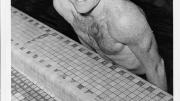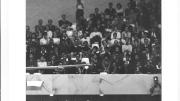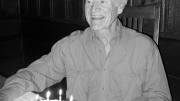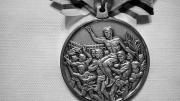At four foot eleven and 90 pounds, teenager Frank Gorman ’59 was deemed too short to join his high-school basketball team. Despite excelling as a power forward during his junior-high years in Queens, he says, “I didn’t measure up to the high-schoolers, and track practice didn’t start until the spring. I wanted to do something!”
Perhaps fate organized his high school’s athletic calendar, or he might never have joined the swim team, gone on to Harvard, or won a silver medal in the 1964 Tokyo Olympics.
“I started swimming late, around age seven,” Gorman recalls. “My older brother and sister taught me how to run off a pier and throw myself into the water. Pretty soon, I was turning somersaults.” After he joined the high-school swim team as a diver, Harvard began knocking at the door: “They got in touch the first time when I was a sophomore. They brought me to Harvard and let me hang out with the team.” After offers of tuition aid, a second visit to campus in his junior year, and a bit more schmoozing with the team and coaches, Gorman decided Harvard was the place for him.
The decision to try out for the Olympics was easy. “I’d been dreaming about the Olympics since I was a kid, I just didn’t know what sport,” he says. “Eventually I decided I had the best shot as a diver.” After an unsuccessful tryout for the 1960 U.S. team, he “worked harder and smarter,” and made the ’64 team.
Describing his experience at the Tokyo games, Gorman mentions the Village (“It was a thrill to meet names you had only heard about, and eat lunch together with everyone. I met a famous player for the Dallas Cowboys and some sensational track and field athletes”); the competition (“You’re so involved with what you are planning and hoping to do, that while hanging out in Village with great and famous athletes, your concentration was on the sport”); and the rain (“Tokyo was cold! We had prepared for summer, and they had to buy us jackets and sweaters to keep us warm during the opening ceremonies”). When the time came to compete, he was up against two American teammates. “Each of us thought he’d very much like to see the other two take second and third place,” he says with a laugh. “I was so confident the gold was mine, and all I had to do was everything right.” In the end, he took silver; his teammates took the gold and bronze.
Though his career has shifted from the navy, where as a lieutenant he coached navy divers, to the investment business, and then to telecommunications, Gorman has remained an active member of USA Diving and the U.S. Olympic Committee. He judged the ’68 Mexico City games, and attended the 2008 Beijing games. The college divers today, he says, “are better in every way. As a senior at Harvard, I was finally attempting forward three and a half somersaults. Today the women are executing three and a halfs; the men are doing four and a halfs. Harvard divers are especially fortunate to have coach Keith Miller, whose expertise, experience, and charisma rank him as one of the finest mentors in the diving world.”
Last November, when Gorman returned to Harvard for a celebration honoring the swimming and diving team’s 80 years of NCAA competition, he presented his silver medal to the team. “I realized that it should be in a secure but available setting,” he says. “I didn’t want it to wind up in an attic, a cellar, or someone else’s sock drawer. The Olympic medal is a symbol of an accomplishment that fulfilled my athletic dreams….Those wonderful memories of teammates, coaches, family, friends, fellow Olympic athletes, the bright lights, the competition, the medal ceremony featuring three American flags flying, the sounds of ‘The Star Spangled Banner’ filling the hall of the Olympic Swim Stadium continue to shine brightly in my mind.”









